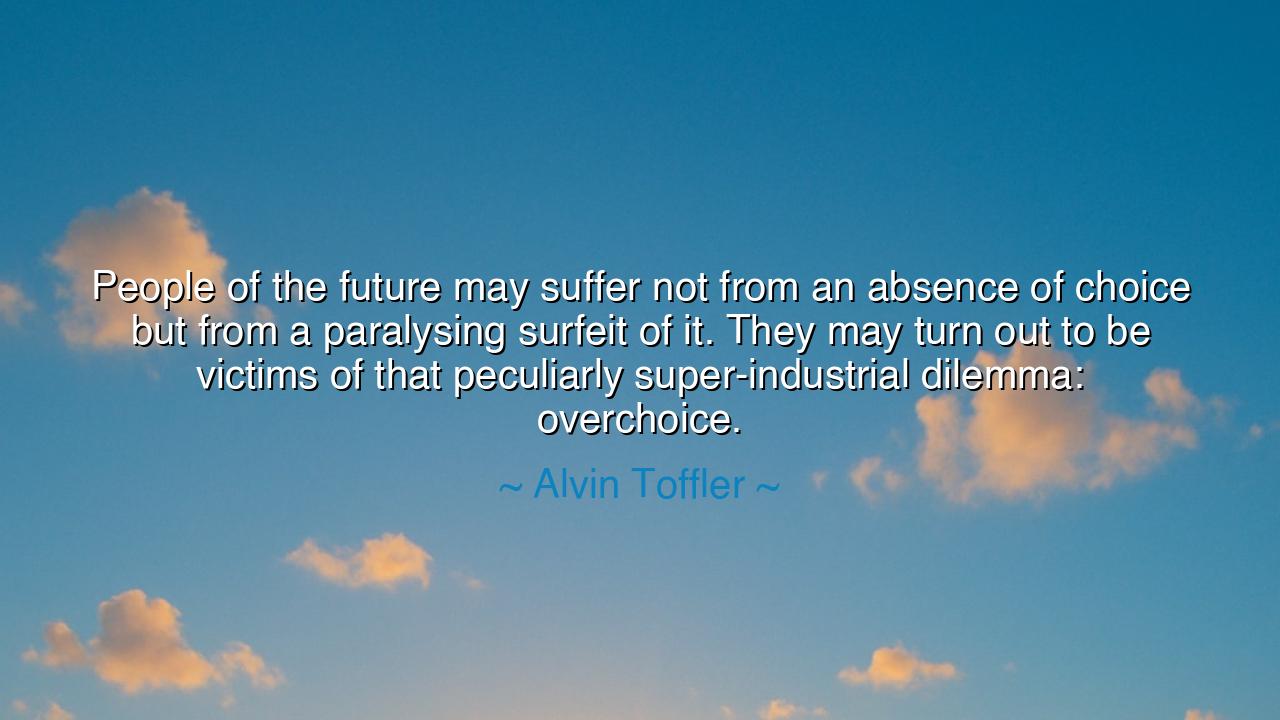
People of the future may suffer not from an absence of choice but
People of the future may suffer not from an absence of choice but from a paralysing surfeit of it. They may turn out to be victims of that peculiarly super-industrial dilemma: overchoice.






The words of Alvin Toffler—“People of the future may suffer not from an absence of choice but from a paralysing surfeit of it. They may turn out to be victims of that peculiarly super-industrial dilemma: overchoice.”—are a prophecy carved from the wisdom of foresight. They are not merely a warning of abundance, but a lament for the soul lost amid excess. Toffler, who gazed into the coming tides of technology and industry, foresaw a world where mankind would drown not in poverty but in plenty. He spoke of a time—our time—when freedom would no longer be bound by scarcity, but by confusion; when the weight of infinite choice would shatter the peace once found in simplicity.
In ages past, men hungered for freedom, for the right to choose their path. They fought wars, toppled tyrants, and crossed oceans to escape the chains of limitation. To choose was to be free, to live as one’s own master. But Toffler, a seer of the modern age, perceived that beyond freedom lies another peril—when choices multiply beyond measure, when the heart and mind are overwhelmed by the tyranny of abundance. For when everything is possible, nothing feels certain; and when all paths lie open, no path feels true. Thus the people of the future—our people—may find themselves paralyzed, unable to act, their spirits dulled by the ceaseless whisper of alternatives.
This truth can be seen even now in the smallest of things. Consider the modern man who stands before endless shelves of goods, or the young woman who scrolls through infinite screens of opportunity. They are surrounded by everything—yet anchored by nothing. The mind, once clear and purposeful, becomes clouded with doubt. “Should I choose this or that? What if I regret it?” In such a world, even pleasure becomes a burden, and decision a torment. It is not poverty that enslaves them, but excess. The wise of old understood this danger long before Toffler gave it name. The Stoic philosophers taught that happiness lies not in having many things, but in needing few. For every added desire multiplies the chains of the heart.
History, too, has borne witness to the ruin wrought by too much choice. In the waning days of Rome, the citizens were offered every indulgence—feasts, luxuries, entertainments beyond measure. Yet as the empire grew richer, the people grew weaker. Their souls, once hardened by labor and duty, became soft and restless. They were buried beneath abundance, and the glory of Rome withered in the shadow of its own indulgence. The same danger now looms over the world Toffler foresaw: a civilization of endless wealth and technology, yet haunted by aimlessness—a people enslaved by their own plenty.
But Toffler’s words are not a dirge alone—they are also a call to wisdom. He does not condemn choice, but urges discernment. Overchoice is not destiny; it is a test. The power of freedom demands the guidance of purpose. Without it, men become like travelers lost in a forest of paths, circling endlessly, never finding home. Yet with purpose—clear, steadfast, and true—choice becomes a blessing once more. To choose well, one must first know who they are and what they seek. The heart that is anchored in values will not drift upon the sea of excess.
The lesson, then, is this: simplify to strengthen. Seek not to possess all things, but to master yourself. Limit your choices to those that serve your highest good. When you find yourself overwhelmed by possibility, remember that each “yes” is also a thousand silent “no’s.” Choose with intention, not impulse. For in the end, it is not the breadth of options that gives life meaning, but the depth of commitment. The wise do not wander from feast to feast—they find nourishment in one true meal.
To the generations of the future, Toffler’s prophecy stands as a mirror and a warning. Do not mistake abundance for freedom, nor confusion for progress. A life filled with everything can still be empty of meaning. Let your choices serve your soul, not suffocate it. As the ancients once said, “The man who chases two hares catches none.” Choose your path with courage, walk it with clarity, and hold fast to simplicity—for in a world of overchoice, the rarest treasure of all is peace of mind.






AAdministratorAdministrator
Welcome, honored guests. Please leave a comment, we will respond soon